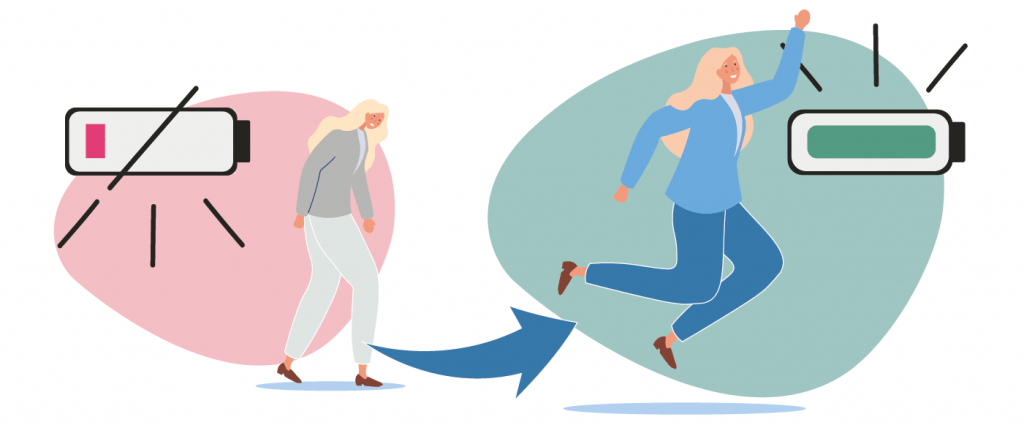Happiness is something we all strive for in life. But did you know that being happy can also have health benefits, including helping maintain a healthy bladder?
We’re going to deep-dive into why happiness and confidence are so good for you and your body. Furthermore, because it’s not always easy to prioritise your happiness, we’ve gathered some tips on looking after your emotional and mental wellbeing.

How do happiness and confidence benefit your health?

It might seem strange, but happier, more confident people also tend to be healthier! In fact, studies have shown that people who are more optimistic live longer and have a greater chance of living past the ripe old age of 85.1 This is due to a variety of factors, including:
Happiness and healthy habits
Research has shown that happier people tend to eat healthier diets. One study found that people with a positive attitude are 47% more likely to eat fresh fruit and veg than their less optimistic peers.2 Getting your five-a-day significantly improves your health, thanks to nutrients that help protect you against noncontagious illnesses, such as heart disease, diabetes and cancer.3
These healthy habits are also really beneficial if you experience bladder weakness. There’s evidence that eating a varied, vitamin-richdiet can improve your bladder health, thanks to Vitamin C and D, which have been shown to decrease the risk of frequent urination.4
Happiness boosts your immune system
Research has shown a link between happiness and a stronger immune system, thus helping protect you against coughs and colds.5
A sturdy immune system positively impacts your bladder health, as stress incontinence is made worse by coughing and sneezing, which put pressure on your bladder.6 If you experience leaks due to bladder weakness, try a discreet option such as the iD Light range. These continence pads are designed for light leaks and are anatomically shaped and flexible, making them ultra-comfortable.
Confidence is a form of stress relief
Happiness has a positive effect on your health, but did you know that higher self-esteem does too? Self-confidence impacts how you view the world; if you have confidence in your ability to handle a situation, you’re less likely to get stressed out about it7.
A potential consequence is (stress) incontinence. While this doesn’t mean you experience leaks because you’re stressed, studies have shown that people experiencing anxiety, stress or depression have an increased risk of developing urinary incontinence8. So, decreasing stress through improving your confidence could also positively impact your bladder health!

How to become happier and more confident
Now you know all the benefits, you’re probably wondering, ‘But how do I get or stay happy and confident?’. Here are our top suggestions for boosting your mood:
- manage your stress levels through exercise and time-management techniques.9 Physical activity releases feel-good hormones that naturally improve your mental health10
- make time for things that make you feel good, such as spending time with a friend or having a luxurious bubble bath
- change the way you talk to yourself to boost self-esteem. Instead of criticising yourself when something goes wrong, think about how you’d talk to a friend in the same situation11
- make sure you get your eight hours, as sleep deprivation increases your risk of depression and higher stress levels.12 If night-time leaks are affecting the quality of your sleep, try iD pants to keep you dry and comfortable.
Being happy and confident in yourself has so many health benefits that it’s well worth carving out time for self-care and stress management. Check out our other blogs for more handy tips on leading a happy, healthy lifestyle.
Sources
1 “If you are happy and you know it… you may live longer”, David R. Topor, 16 October 2019, Source: https://www.health.harvard.edu/blog/if-you-are-happy-and-you-know-it-you-may-live-longer-2019101618020
2 “How Being Happy Makes You Healthier”, Daisy Coyle, 27 August 2017, Source: https://www.healthline.com/nutrition/happiness-and-health
3 “Healthy diet”, World Health Organization, n.d., Source: https://www.who.int/initiatives/behealthy/healthy-diet
4 “Are there dietary changes I can make to deal with overactive bladder?”, Jennifer K. Nelson, 17 April 2020, Source: https://www.mayoclinic.org/healthy-lifestyle/nutrition-and-healthy-eating/expert-answers/diet-and-overactive-bladder/faq-20322774
5 “How Being Happy Makes You Healthier”, Daisy Coyle, 27 August 2017, Source: https://www.healthline.com/nutrition/happiness-and-health
6 “Stress incontinence”, Mayo Clinic Staff, 19 March 2020, Source: https://www.mayoclinic.org/diseases-conditions/stress-incontinence/symptoms-causes/syc-20355727
7 “Raising Your Self Esteem for Stress Relief”, Elizabeth Scott, 21 October 2020, Source: https://www.verywellmind.com/why-an-how-to-raise-your-self-esteem-for-stress-relief-31448204
8 “6 tips for easing stress and anxiety from overactive bladder”, Morgan Meissner, 7 June 2021, Source: https://www.medicalnewstoday.com/articles/tips-for-easing-stress-and-anxiety-from-overactive-bladder
9 “How to be happier”, NHS, 28 February 2019, Source: https://www.nhs.uk/mental-health/self-help/tips-and-support/how-to-be-happier/
10 “Physical activity and your mental health”, Mind, March 2019, Source: https://www.mind.org.uk/information-support/tips-for-everyday-living/physical-activity-and-your-mental-health/about-physical-activity/#HowCanPhysicalActivityHelpMyMentalHealth
11 “How to be happier”, NHS, 28 February 2019, Source: https://www.nhs.uk/mental-health/self-help/tips-and-support/how-to-be-happier/
12 “All The Ways Sleep Affects Your Happiness, In One Chart”, Lindsay Holmes, 23 July 2015, Source: https://www.huffingtonpost.co.uk/entry/all-the-ways-sleep-affects-your-happiness-in-one-char_n_55ae4d55e4b07af29d564a29